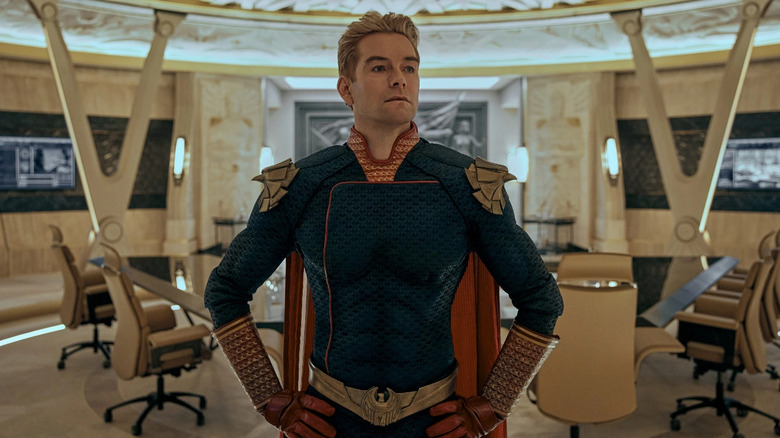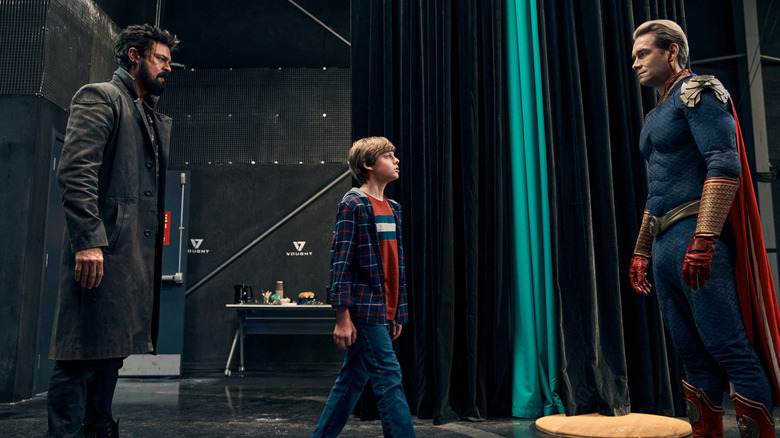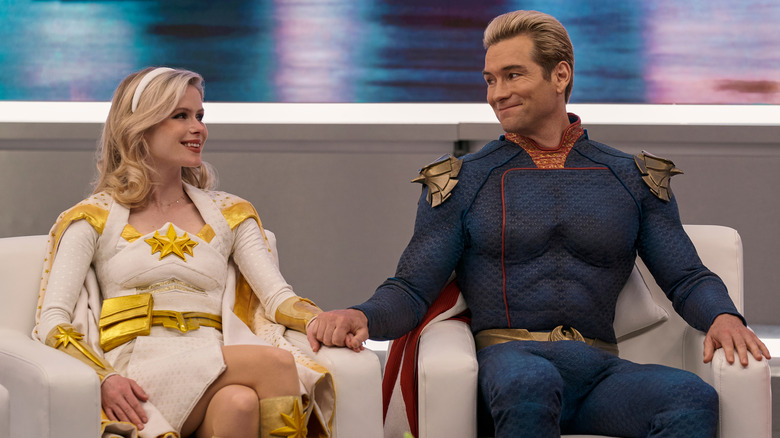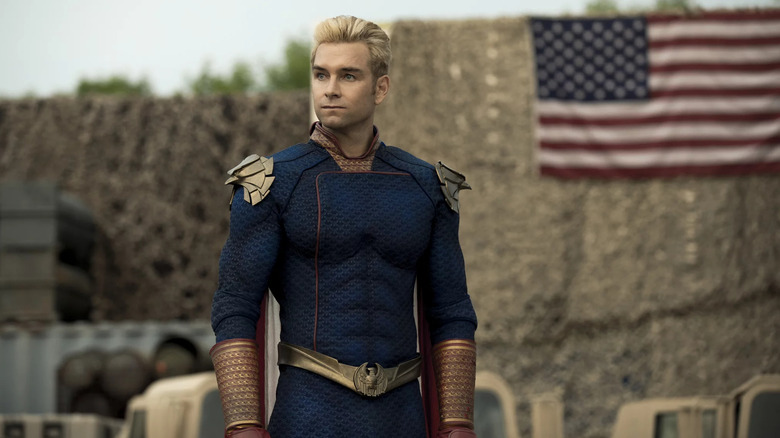The Boys Season 4 Will Deal With An All-Too-Familiar Real-World Theme
Prime Video's subversive superhero satire "The Boys" is known for pushing boundaries of all kinds: whether that means forever changing the way that the world will look at seafood, or upping the ante when it comes to political commentary from men in capes. "The Boys" isn't your average superhero series — it's meaner, bloodier, and much more depraved. Three seasons into its run (with a fourth on the way), audiences are well aware that debauchery awaits when they tune into the super-fighting saga. But that doesn't mean that this series can't still pack a surprising punch.
The season 3 finale of "The Boys" left a lot of fans distraught and for very good reason. After being knocked down several pegs and finally seeming on the verge of defeat, the series villain Homelander (Antony Starr) has risen from the ashes of his low point and reclaimed his spot at the top of the Vought pecking order. If that cliffhanger left a bad taste in your mouth, just know that it's exactly what showrunner, executive producer and head writer Eric Kripke intended.
When the season came to a close in July of this year, Kripke told Insider that he expected some frustration but didn't mind in the slightest: "My guess is they're gonna be shaking their fists at the writers," said Kripke. "But I've learned a long time ago there's a difference between 'hate' and 'love to hate.' And I think we're on the right side of that line. You want your audience riled up."
Everything will (probably) work out in the end
Surprisingly, the man who regularly pens unspeakable horrors for this series also offered some comfort to those rightfully worried about Homelander's latest victory. "The story's not over," Kripke said, adding:
"Hang out, folks. There's more story to tell and I'll make a pledge to you right now that I will not end this series with Homelander winning. So, you can hold me to that."
The bleak finale cliffhanger is meant to set the stage for big themes that'll play into season 4. Kripke explained that ending on that chilling note was the show's way of "really lining up what the Boys are gonna be up against next year."
After an entire season spent approaching the edge of madness — spurred on by his dwindling popularity, the loss of Stormfront, and life-changing revelations about Soldier Boy — it was inevitable that Homelander would finally snap. The final scene sees him triumphantly descending on a rally filled with supporters and protestors alike, only to be attacked by someone throwing a can and screaming, "F*** you, fascist." Homelander reacts by murdering the protestor with his laser beams, an act that's ultimately met with cheers. The idea that he can get away with that — and, in fact, gain support for it — is exactly what the fourth season will grapple with. In the same chat with Insider, Kripke explained:
"Homelander is getting his followers so whipped up into a frenzy that, as we said in the writer's room, he literally kills someone on 5th Avenue and people cheer for him, it's a sign of the devotion of his followers and it's not an accident that there's also a bunch of these well-meaning, lefty Starlighters."
Setting the stage for season 4
In a season so heavily focused on the idea of finding a weapon to kill Homelander, it's easy to see why some walked away frustrated; between the titular Supe killing squad losing their ability to mess around with V-24 and Homelander back in the spotlight, "The Boys" season 3 feels like it ends close to where the first season began. Our underdogs are fighting off the Supe corporation from the shadows, while the all-powerful Homelander smiles at his crowd of fans. But don't let those details fool you — the third season of "The Boys" has completely upended the status quo.
Homelander's popularity is no longer with the general population. Instead, he commands a specific fanbase of extremists, thrilled to see him commit outright murder. The truth about Vought corruption revealed by Starlight (Erin Moriarty) vs. the illusion being upheld by Homelander has created a schism that's more defined than ever. Kripke broke it down further, saying:
"It's a hint of one of our big themes in season 4, which is society as a whole is fracturing into these two factions, and no one's listening to each other, and the threat of violence just gets worse and worse every day. It's an appetizer of what all these superheroes are gonna be doing to society in season 4."
The scarily familiar rise of fascism
Like everything we've seen from "The Boys" thus far, the upcoming fourth season is drawing from real-life events. After all, it's not hard to see where the third season was pulling from, given its interest in Homelander's extreme followers. (Unless you're an alt-right Reddit troll, of course — because in that case, it's really hard to look into the mirror.) Donald Trump (who parallels Homelander in more than a few ways) once boasted that he could shoot someone and not lose voters: well, Homelander has put that disturbing theory to the test, murdering someone in broad daylight and gaining fans for it.
Going into the next season, Homelander will have even more freedom to be his unabashed, terrible, monstrous self: he's found a contingent he can finally speak to without faux-smiles for the camera. Sound familiar? It's all pretty damn bleak and a little too close to our current hellscape, but if there's any show that we can rely on to somehow still inject levity into that political parallel, it's the hyperviolent, hyper-sexual, and regularly absurd package that is "The Boys."



